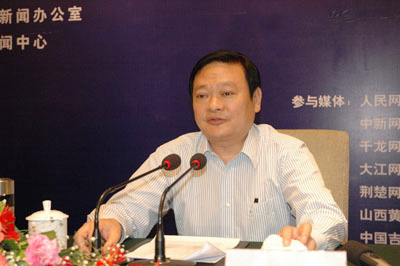| Home / Government / Local Governments News | Tools: Save | Print | E-mail | Most Read |
| Shanxi Governor: No More Polluted GDP |
| Adjust font size: |
Shanxi Province is committed to reducing the energy consumption per capita of gross domestic product (GDP) and hopes its economy to achieve scientific and sustainable development in the next three to five years, Yu Youjun, governor of this north China province, said Friday.
"We do not pursue a high-energy-consumption or blood-tainted GDP growth any more, as the fragile ecological system in Shanxi cannot stand any further destruction," Yu told reporters. Yu added the government hopes the economy will move towards an ecological development path, even if that means a slower GDP growth for a period of time. The economy "will sure see rapid and sound development three to five years from now". According to the governor, the province aims to reduce the energy consumption by 25 percent during the 11th Five-Year Plan, a bigger cut as compared to the 20 percent target set by the central government for the whole country. Yu said more than 8,000 illegally-run coal mines and those with an annual capacity of less than 90,000 tons have closed since 2005. The government supports large state-owned coal mine groups merging with, acquiring or regrouping small and medium ones, and encouraged the small state-owned mines to regroup with the small private ones through shareholding. "We hope to cut the number of coal mines to 2,000 from the current 9,000," Yu explained. "Those with an annual capacity of over 1 million tons will account for 80 percent of the province's total turnout." He added, the province will further eliminate 3,700 tons of inferior steel production capacity, 1,420 tons of coking chemicals, and 8.5 million tons of cement. "These targets will be applied to specifically-named areas and relevant departments, and those failing to meet the targets will be punished," Yu continued. "The elimination of the backward production capacity will possibly slash billions from the total GDP and tax revenues. But we are willing to pay the price for the long-term development of Shanxi's economy, for blue sky and clear water," he said. Along with the drive to increase energy efficiency, efforts were also made to promote the comprehensive use of energy, water, land, materials and resources in such industries as coke£¬coking chemical, building materials, power, and some 200 high energy-consumption enterprises. The government also stresses the importance of developing a circular economy - to push energy-consumption through the transfer of an economic growth mode. "In accordance with the circular economic development plan, 30 sustainable ecology parks and 100 circular trial production enterprises have been started to bring in advanced energy-cutting and cleaning technologies for enterprises." Yu said. (Chinadaily.com.cn May 21, 2007) |
| Tools: Save | Print | E-mail | Most Read |
| Related Stories |
|
|
||||||||||||
|
| Links | |||||||||||
|
